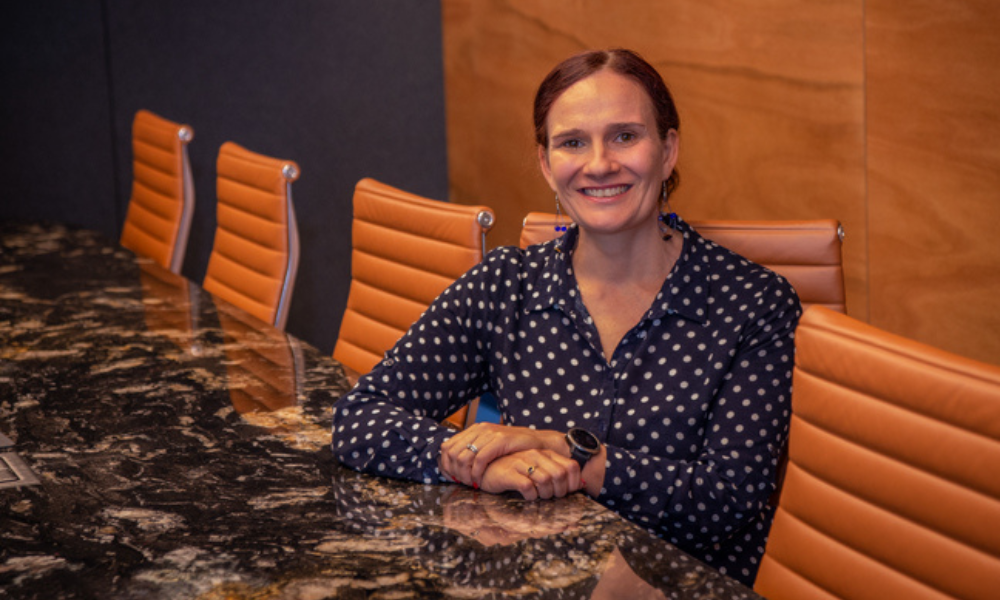
People manager reveals the trials and tribulations of upskilling employees on EI

As any HR leader knows, competition for top-tier graduates is more intense than ever before. The tight labour market combined with immigration laws means that the market is sparse – even for the most prestigious employers. Construction giant Kapitol is bucking that trend with a training program that’s seen a dramatic increase in the number of graduates applying to the company.
“It’s such a complex industry and it’s hard to train your graduates in every aspect of the business, so this year, we took all our graduates and cadets away with the directors and executive team, and we had three days of intensive training along with some fun and bonding time,” says Alice Hanna (pictured above), people and culture manager at Kapitol and recent recipient of the Australian HR Manager of the Year at the HRD Awards 2022.
It’s not often that graduates get to sit down with directors, but the opportunity to drill down into the details of the work and explore wellbeing was appreciated by both sides. One of the topics that graduates rated the highest was “difficult conversations”.
“In the construction industry you don’t just have your own team, you have hundreds of sub-contractors and suppliers on site too – there’s a lot of difficult conversations going on throughout the day,” Hanna says. “It can be really hard for a graduate to walk out on site and know how to handle a conversation with a big, burly contractor who has been in the industry for years.”
At their recent retreat, graduates, directors and executives split up into small coaching groups and addressed questions such as: How do we have this conversation? What do I do if this person says that to me?
“It sounds really small, but graduates came away with stars in their eyes because they had learnt how directors handle these conversations that terrified them,” Hanna says.
There was such positive feedback that graduates asked if Kapitol could repeat the exercise quarterly. The directors readily agreed that it was a great opportunity to discover the issues that graduates were having difficulty with. The model has been so successful, Kapitol ran a similar retreat for project coordinators and is thinking of where else it can be deployed.
“I know a lot of these retreats are just a booze fest, but this has allowed graduates to bond with our directors and given them focussed training time when they are normally so busy on site,” Hanna says. “On so many levels it was a winner. Six months later, participants say to me I use tips from that resilience training. Or, one said to me, I used those breathing exercises we were taught when my partner had a panic attack. It was lovely to hear that it had an impact on that person’s wider life.”
Cultivating soft skills in an industry dominated by tough guys may have daunted some. Not Hanna, who has a background studying psychology and wrote the course work herself.
“Psychology has always been my passion and while I’m sure there is much better training out there, this allowed me to tailor it to our people,” she says.
One of the most powerful topics has been on emotional intelligence. Hanna says that it doesn’t matter how good leadership training is, or how good unconscious bias training is – if you don’t have good self-awareness and emotional management, then all the other soft skills training “will slide straight off”.
Most people at the company have been through emotional intelligence training and while Kapitol is by no means the first company to offer it, many participants in construction had never heard of it.
“A lot of them looked at me like I was an alien, wondering why we were going to talk about feelings for two hours. But by the end of it, I could see they were really thinking about their own self-awareness, how they manage themselves in difficult situations, how they read a room,” Hanna says.
“Leaders were saying to me: I know how I can use this during conflict resolution, and to improve myself,” she says.
When everyone is so busy day-to-day, there is little time for reflection on behaviours. But following the training, that has changed. One director in particular often calls Hanna when driving home, to say how he reflected on a conversation and realised he shouldn’t have said that, or he wanted to add that, or he forgot to say congratulations.
“He has that self-awareness and reflects back on his day, which I think is really powerful,” she says.
Stress management and resilience training has also been embedded. Hanna says more widely there is criticism that stress training pushes the responsibility back onto the workers. While that’s true, argues Hanna, life and work is inherently stressful. Resilience isn’t being able to stand firm in the storm, it’s about having built those great healthy psychological habits every day.
“If you can give people the tools to build good psychological practices all of the time, they can be prepared for the tough times,” Hanna says.